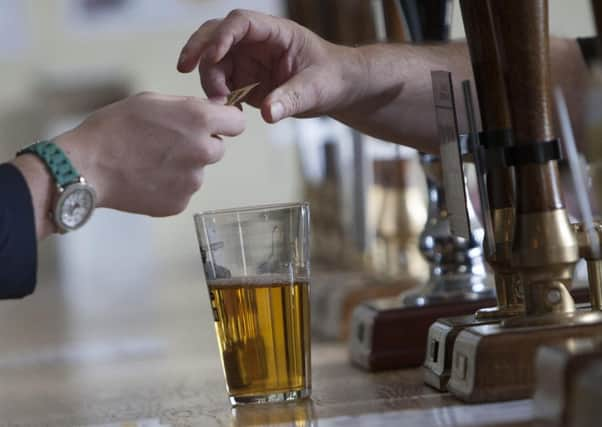War of words intensifies in Scottish pub fight


Yale, who used to run a pub in Oldham, has now waded into an increasingly acrimonious debate over the thorny issue of the future of pubs in Scotland.
He has thrown his weight behind the Protect our Pubs campaign, launched by Scottish Labour MSP Neil Bibby in a bid to establish a Scottish Pubs Code aimed at providing greater protection and freedom for tenants in tied agreements under which where they pay rent to pub owners, with an obligation to purchase alcohol from a particular brewery or company.
Advertisement
Hide AdAdvertisement
Hide AdBibby’s proposed bill comes as the controversial deal which would see Heineken purchase 1,900 pubs from Punch Taverns, currently being scrutinised by competition watchdogs, comes to a head.
Punch recently told its tenant landlords that the deal, which has come under scrutiny by competition watchdogs, should go through by the end of August.
But the move has been criticised by the likes of the Punch Tenant Network which argues it will result in pubs that look the same and serve the same beer across the country.
Paul Waterson of the Scottish Licensed Trade Association (STLA), has also been highly critical of a deal which he said would create a “monster” and was a backwards step for the sector.
Heineken hit back at that claim, pointing out that if the offer is successful it would only own around 6 per cent of the the 4,900 pubs in Scotland. The brewing giant also says its plans to pump a record £4 million into its Scottish estate this year underline its commitment to communities.
It said the investment north of the Border will see £2.8m allocated to “transformational projects” with an average spend of £162,000 per pub, creating more than 150 jobs across the country.
Advertisement
Hide AdAdvertisement
Hide AdMore than a third of the money will be spent on community locals, introducing food and coffee and “transforming them into great local pubs for the whole community to enjoy”.
But that investment announcement prompted former Star Pubs & Bars tenant Yale to wade into the debate in Scotland.
• READ MORE: Industry concerns raised over Heineken’s Punch move
He argues investment by pubcos comes at a price for tenant landlords through increased rents, wholesale prices and charges for services to recoup the investment. Yale said he was “all too familiar with how persuasive pubcos can be”.
“They mask wholesale price increases and inflated prices for vital services through the promise of investing in their tenants’ businesses.
“Be assured, these licensees have already paid for a portion of this investment through their inflated product costs which they are forced to stock, and they will certainly be footing the bill for the rest over the course of the next few months.”
Yale said many prospective business owners are “lured in with the promise of significant support” from pubcos.
“They promise you the world but there is little or no follow through. Pubcos will continue to act in this manner unless they are regulated by the Scottish Government. Scotland needs a pubs code and it needs one fast.”
Advertisement
Hide AdAdvertisement
Hide AdPaul Waterson, Scottish Licensed Trade Association (SLTA) chief executive, agrees and says that while on the surface it may appear pubcos are investing in the Scottish pub estate, “licensees are effectively being lent their own money to make these improvements”.
“Pubcos will increase both rents and the price of products and services across these outlets to recoup their investment. Usually this one sided “investment” is taking place in city centre premises and not in traditional outlets which are most in need of investment and the stability it brings.
“Tough times for pubs and bars across the country are made worse by unworkable arrangements placed on tenants through tied arrangements. Tied arrangements reduce choice for consumers, can lead to inflated pricing and ultimately cause businesses to close.”
The SLTA has thrown its weight behind Bibby’s private members bill and is urging licensees, MSPs and pubgoers to respond to the consultation currently underway.
Bibby argues that the tied pub industry in Scotland has “long been in need of reform” and lags behind England and Wales where greater protection is in place. He says tied pubs are 62 times more likely to close than their free trade counterparts, divert £40m from the Scottish economy, and that 99 per cent of tenants want protection against them.
“My bill would ensure a fairer deal for Scotland’s tied tenants by giving them the same rights as their counterparts down south, would result in greater choice for consumers as well as ensuring the protection and creation of jobs in Scotland’s pub and brewing industry,” he argues.